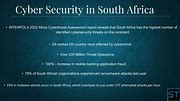Africa stands at the forefront of financial technology innovation, yet it grapples with challenges in the education and educational technology (EdTech) sectors. As reported by TechCabal, the continent boasts a thriving fintech industry, attracting significant venture capital investment due to its promise of delivering faster, cheaper, and more efficient services. However, when it comes to education, Africa faces significant hurdles, with statistics showing that its education system is one of the poorest performing globally. In some regions, up to 90% of children complete primary school without acquiring basic reading skills.
“Africa is a global leader in fintech but continues to struggle with education and edtech.”
While fintech companies received a substantial portion of last year’s African venture capital investments—capturing 60% of the total—the education sector lags behind significantly. Surprisingly, despite being an over $160 billion market annually (nearly three times larger than remittances), EdTech ventures receive less than 2% of venture capital funding. The disparity arises from a fundamental issue: many African EdTech startups prioritize developing sophisticated technology over understanding their target customers’ needs.
“Education receives less than 2% of venture capital despite being a $160+ billion annual market.”
The burgeoning hype around artificial intelligence (AI) in the education sector poses additional challenges for African EdTech initiatives. Governments across the continent are increasingly embracing AI solutions in education. For instance, Nigeria recently announced plans to train thousands of teachers in AI technologies—a move reminiscent of past tech-centric educational initiatives that failed due to poor implementation and unsustainable business models.
“The hype fueling artificial intelligence threatens to amplify edtech failures.”
Reflecting on previous endeavors like the One Laptop Per Child initiative—which aimed to provide affordable laptops to students—countries such as Peru experienced minimal learning outcomes despite significant investments due to maintenance issues and inadequate teacher training. This cautionary tale serves as a stark reminder that implementing great technology without considering practical challenges often leads to failure.
“Maintenance issues, lack of power… meant 50%+ laptops stopped working within years.”
Innovative solutions leveraging AI technologies are emerging in the EdTech space—for example,
a Kenyan startup offering AI-powered teacher support via WhatsApp—an intelligent choice given Africa’s high mobile phone usage rates. However,
“the company’s decision”
to charge already underpaid teachers for this service highlights a flawed business model that overlooks governments as potential partners who could significantly scale such initiatives.
“A cost-effective product is meaningless if no one uses or pays for it.”
Notably,
“governments are responsible for approximately 70%”
of all educational spending within Africa but remain underserved by many existing EdTech providers who primarily cater to elite private schools or families with internet access.
Moreover,
“a vast majority
“
of learners lack consistent access to digital devices—a critical factor overlooked by numerous tech-focused solutions aiming for widespread adoption.
“
It’s about designing business models that work in the real world.
“
Highlighting another crucial aspect,
“
a case study involving USAID’s investment
“
in Kenya’s Tusome early-grade reading program reveals how substantial monetary injections do not always translate into desired educational outcomes if programs lack demand-driven approaches and sustainable financing models.
“
The emphasis on engagement over mere cost-effectiveness
“
is pivotal; successful products must captivate users effectively rather than solely focus on affordability.
As Karim Mohamed aptly puts it,
“
If edtech doesn’t engage users like TikTok does—it will fail regardless of how smart the AI is
“
. This sentiment underscores [SOURCE]‘s insightful perspective on why innovative technologies alone cannot solve complex educational challenges without robust business strategies tailored towards real-world demands.
Embracing this holistic approach towards reforming Africa’s educational landscape might entail establishing frameworks akin
to Gavi—a successful global health initiative—that empowered governments
to procure vaccines efficiently.
“
It is time for Africa’s edtech ecosystem
to build its own Gavi,”suggests Mohamed.
The urgent need for sustainable financing mechanisms underscores how relying solely on AI innovations may not address these systemic issues adequately.
Karim Mohamed’s extensive experience underscores his call-to-action: reimagining how we finance,
implement,
and expand EdTech solutions across Africa is vital
to overcoming current obstacles plaguing educational advancement on
the continent.
—
as reported by [TECHCABAL]
Attribution link: https://techcabal.com/2025/05/28/rethinking-african-edtech/









Leave feedback about this